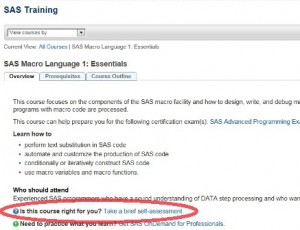We all know SAS offers a rich variety of resources that help users to continuously build their skills. However one of the biggest questions plaguing SAS users is ‘where do I begin’ or ‘what’s next’. Considering the vast array of options to choose from, SAS developed several helpful tools to aid in determining users’ skill sets.
One of the many valuable tools SAS Training provides is the Pre-course assessments, currently available for all SAS users, to help determine their readiness for a given course. Each assessment is completely confidential, anonymous and contains 10 to 20 multiple choice questions that are designed to help define the most appropriate training based on prior knowledge and experience. Once an assessment is completed, a score, including the number and percentage of questions answered correctly, is reported, and a course recommendation is made. A score of 70 percent or higher suggests that the student has the skills and knowledge necessary to take the course. A score below 70 percent suggests that a different course may be needed to provide the prerequisite skills and knowledge that are lacking, and a course recommendation is made. “Prospective students see the score and the recommendations from SAS, but the choice about which particular class they will take is theirs,” said Linda Mitterling, Senior Director, Education.

SAS instructors are also reaping the benefits of the new assessment tools. Students without the correct prerequisite knowledge can fall quickly behind in a class and instructors may find themselves challenged to keep up the appropriate pace. In a recent class in Irvine, the self-assessment quizzes proved extremely beneficial to SAS instructor Jim Simon. After administering the test to students before an advanced class, Jim found that they did not have the required prerequisites. Jim says “I don't think I could have convinced these students to transfer, and that would have been a disaster for the students. Now, both students are enthused about the [course]material and delighted with their choice to transfer courses. The quizzes made a huge difference in this and other situations I have encountered”.
The SAS Education Division plans to develop more precourse assessments across other training curricula in 2012.

4 Comments
SAS is a great programme for Wordwide in statistics, I like to receive any lessons for learn to use your software in real usage,please give me this help. If you can support chiper value for sell your software(because the sake of self economic in privacy) in accessiblably
If you live in the US or Canada, you might want to consider SAS OnDemand for Professionals, which is an affordable, learning version of SAS. http://support.sas.com/learn/ondemand/professionals/
it is misleading. If I get a perfect score on a Level 1 assessment, it doesn't necessarily mean that course is right for me. What if I also get 9 of 10 on the Level 2 assessment?
a perfect score should mean "this course is too simple for you, try the next course up".
You are absolutely correct when you say that if you get a perfect score on the Level 1 assessment, it does not necessarily mean that the course is right for you. Our pre-course assessments were designed to help illustrate what type of pre-requisite knowledge you should have before attending a class. The idea is that if you do not have the correct prior knowledge, then you MAY not be ready to take the class in question. We have found that students often sign up for courses without even looking at the pre-requisites for a course, and even if they do, reading a list of items is not the same as actually looking at examples, such as those on the assessments. We are careful in our pre-course assessments to tell customers what their score is so they can make their own judgment call about what they should take. We do not require a certain score or tell someone that they cannot take a course if they don’t pass the assessment. Customers always have the option of calling SAS Education (800-333-7660) and speaking to a service representative about which course might be best for them. All of these tools are to try to help a customer in making a decision about the right course for them based on their knowledge, skills and experience.